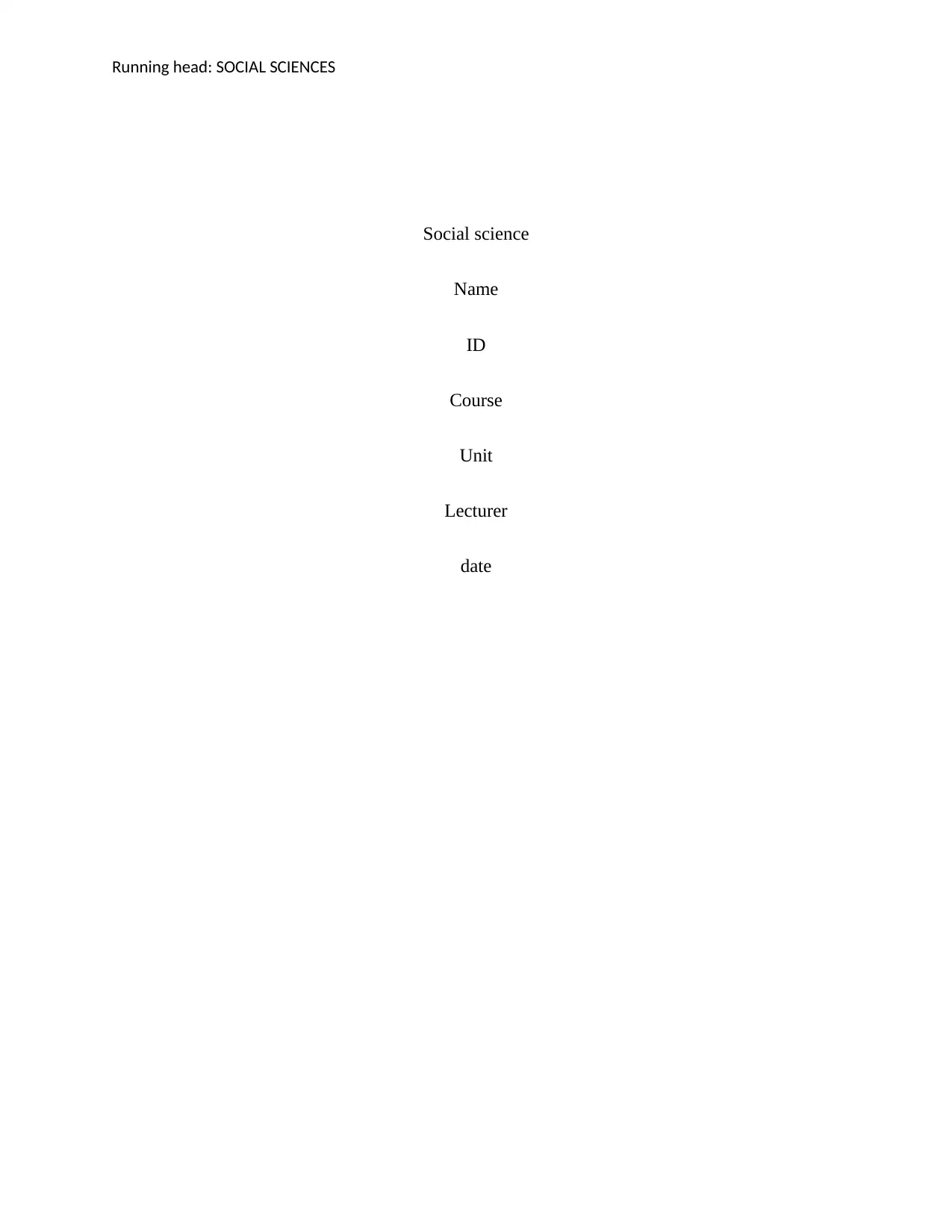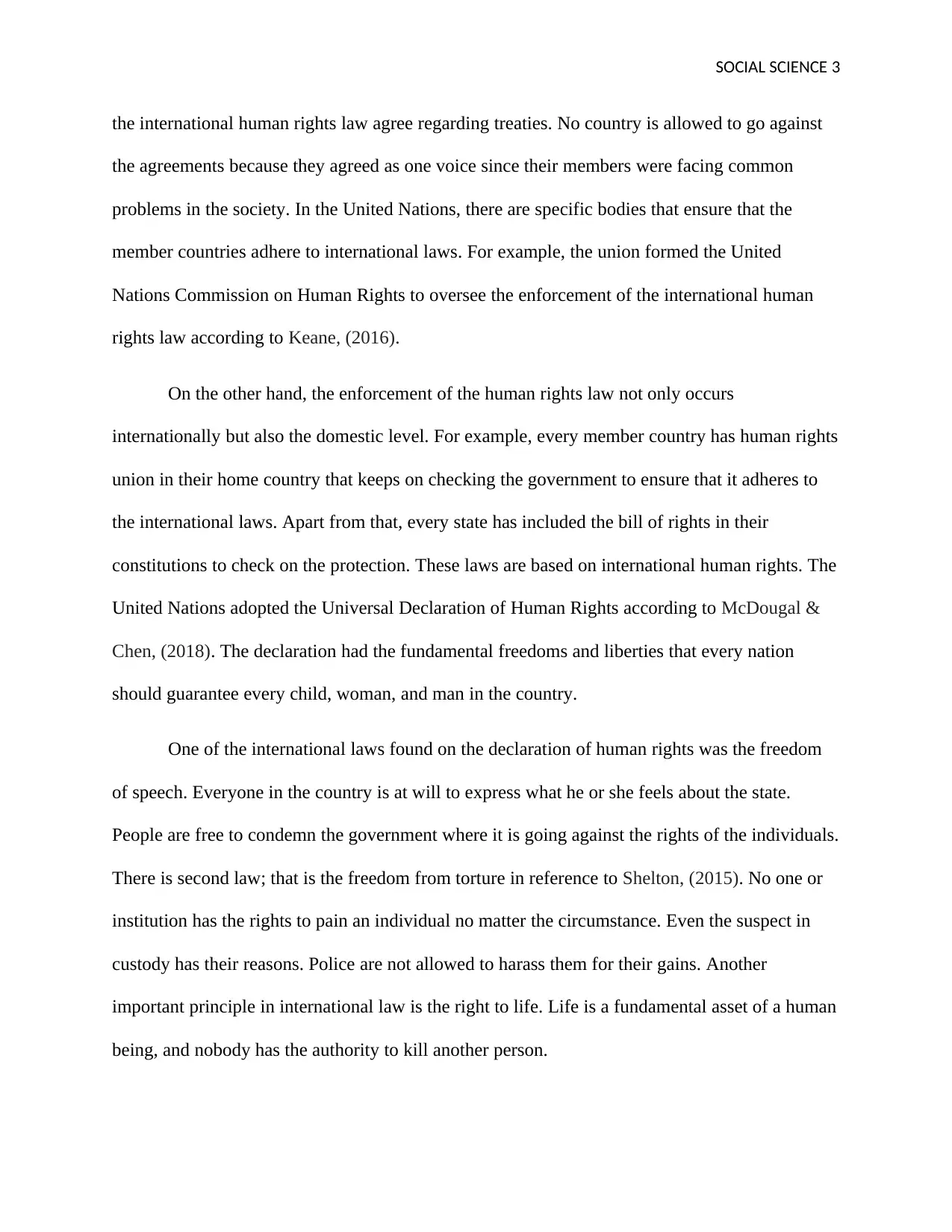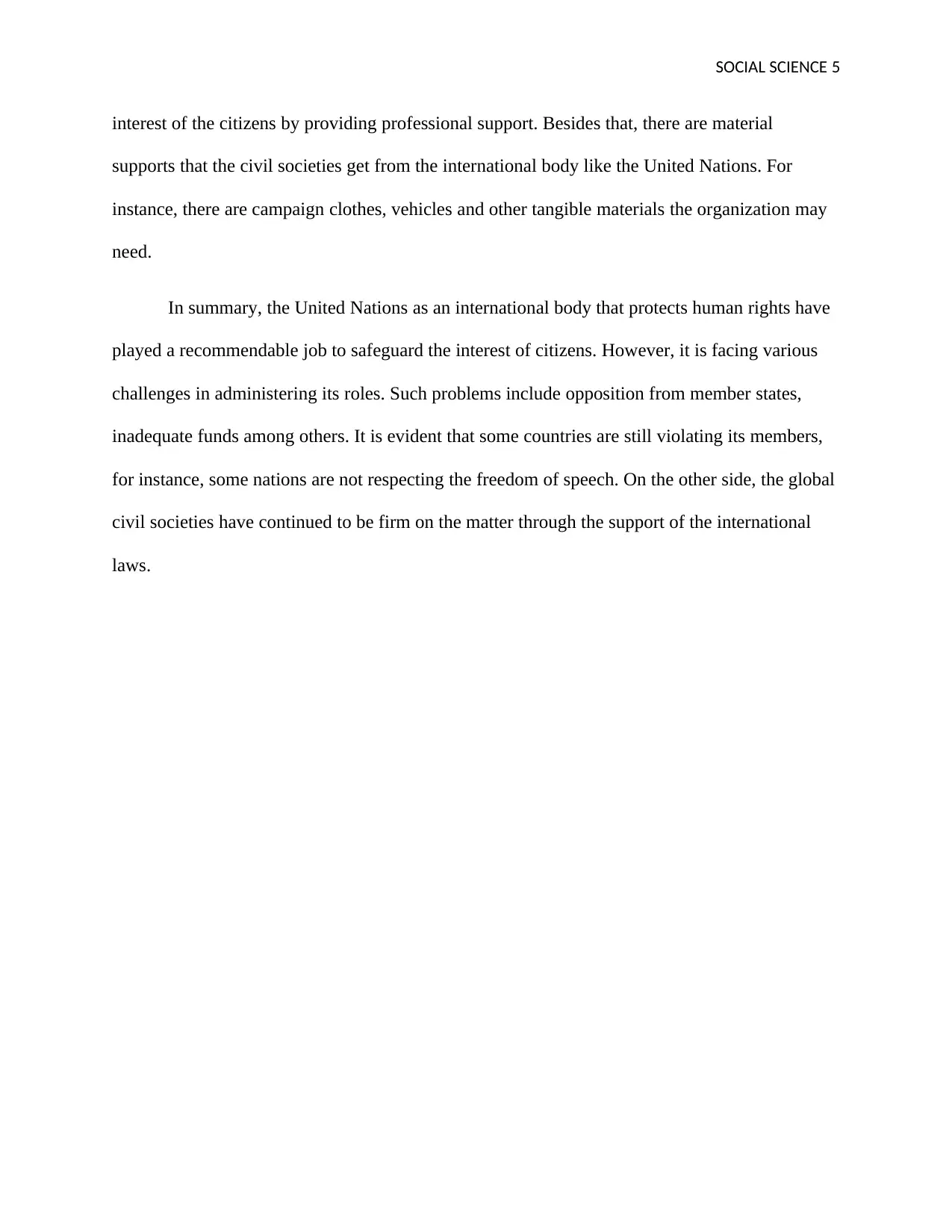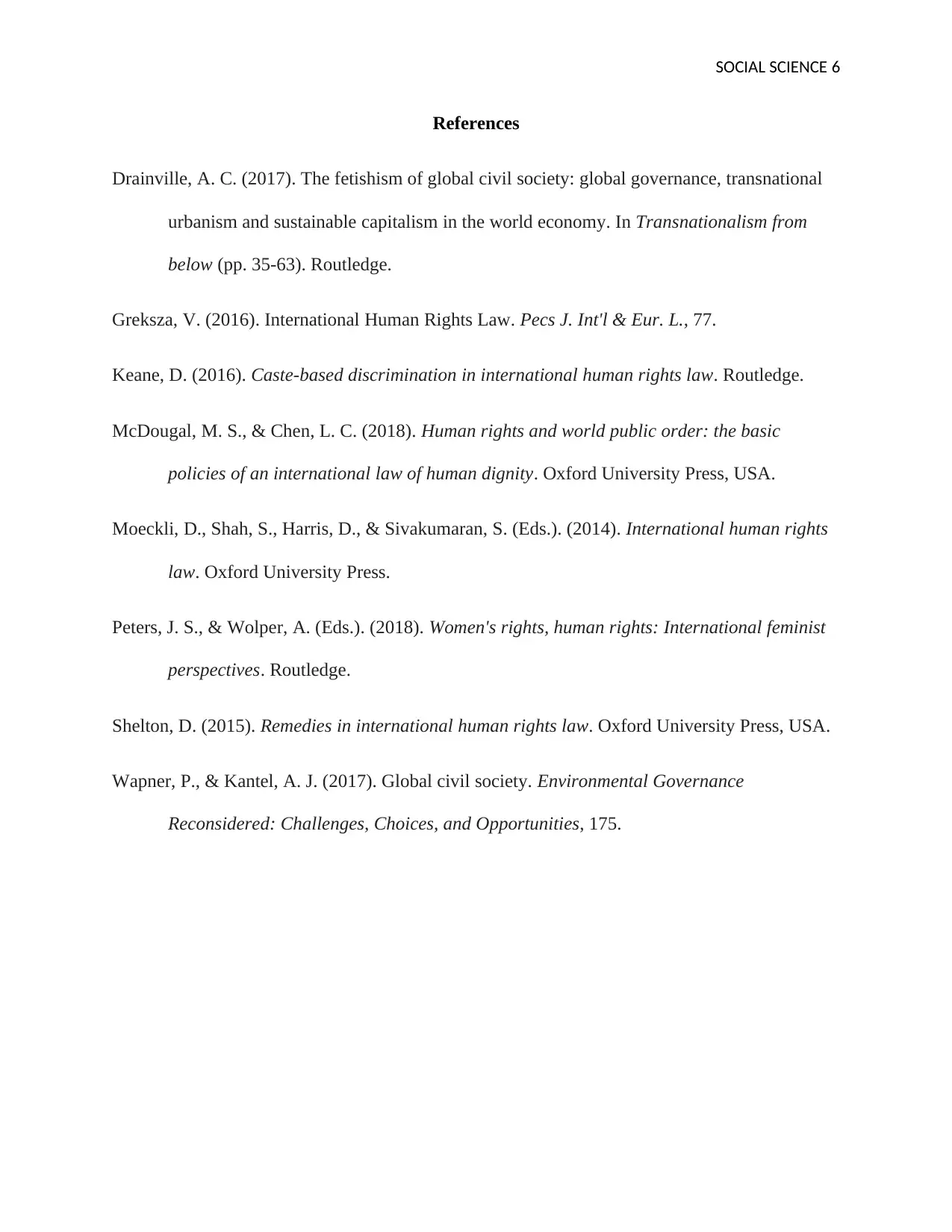Essay on International Human Rights Law and Global Civil Society
VerifiedAdded on 2023/05/31
|6
|1433
|87
Essay
AI Summary
This essay examines the intersection of international human rights law and global civil society. It begins by defining international human rights law, emphasizing its universal application and the role of bodies like the United Nations in establishing treaties and overseeing enforcement. The essay highlights key principles such as freedom of speech, freedom from torture, and the right to life, while also acknowledging limitations. It then defines global civil society as organizations working to uphold the rule of law and protect human rights. The core of the essay focuses on how international human rights law supports these civil societies through financial aid, knowledge sharing, and material support. The essay concludes by summarizing the challenges faced by international bodies and the ongoing efforts of civil societies to promote and protect human rights globally.

Running head: SOCIAL SCIENCES
Social science
Name
ID
Course
Unit
Lecturer
date
Social science
Name
ID
Course
Unit
Lecturer
date
Paraphrase This Document
Need a fresh take? Get an instant paraphrase of this document with our AI Paraphraser

SOCIAL SCIENCE 2
International human rights land and how it supports global civil society
Introduction
People face universal challenges around the world. Examples of the problems are the
violation of human rights such as the right to life, protection, ownership among other universal
rights according to Drainville, (2017). Due to the global challenges that citizens face around the
world, the government from various countries agrees to come together to address such problems.
The law they come up with is what is called the international law, and it applies to every country
that has signed the treaty regardless of the economic status. However, there are a group of people
who push for the implementation of such laws, they come up together and are referred to as a
global civil society. In this assignment, it is going to identify international human rights law and
describe how it supports the global civil society.
International human rights law
International human rights apply to everybody in the world regardless of the country
where the individual comes from in the world in reference to Greksza, (2016). Before the states
agree on the international laws, they sit together and decide on the type of the rules that they are
going to implement as international laws. Despite the agreement of many countries in the world
concerning universal rights, some countries still violate human rights. The increase in the rate of
violation of the human rights called for the formation of international human rights law
according to Wapner & Kantel, (2017).
Consequently, international human rights law refers to the institution or body that aims at
protecting and promoting universal human rights both at the country level and the international
level. An example of international human rights law is the United Nations. The nations that form
International human rights land and how it supports global civil society
Introduction
People face universal challenges around the world. Examples of the problems are the
violation of human rights such as the right to life, protection, ownership among other universal
rights according to Drainville, (2017). Due to the global challenges that citizens face around the
world, the government from various countries agrees to come together to address such problems.
The law they come up with is what is called the international law, and it applies to every country
that has signed the treaty regardless of the economic status. However, there are a group of people
who push for the implementation of such laws, they come up together and are referred to as a
global civil society. In this assignment, it is going to identify international human rights law and
describe how it supports the global civil society.
International human rights law
International human rights apply to everybody in the world regardless of the country
where the individual comes from in the world in reference to Greksza, (2016). Before the states
agree on the international laws, they sit together and decide on the type of the rules that they are
going to implement as international laws. Despite the agreement of many countries in the world
concerning universal rights, some countries still violate human rights. The increase in the rate of
violation of the human rights called for the formation of international human rights law
according to Wapner & Kantel, (2017).
Consequently, international human rights law refers to the institution or body that aims at
protecting and promoting universal human rights both at the country level and the international
level. An example of international human rights law is the United Nations. The nations that form

SOCIAL SCIENCE 3
the international human rights law agree regarding treaties. No country is allowed to go against
the agreements because they agreed as one voice since their members were facing common
problems in the society. In the United Nations, there are specific bodies that ensure that the
member countries adhere to international laws. For example, the union formed the United
Nations Commission on Human Rights to oversee the enforcement of the international human
rights law according to Keane, (2016).
On the other hand, the enforcement of the human rights law not only occurs
internationally but also the domestic level. For example, every member country has human rights
union in their home country that keeps on checking the government to ensure that it adheres to
the international laws. Apart from that, every state has included the bill of rights in their
constitutions to check on the protection. These laws are based on international human rights. The
United Nations adopted the Universal Declaration of Human Rights according to McDougal &
Chen, (2018). The declaration had the fundamental freedoms and liberties that every nation
should guarantee every child, woman, and man in the country.
One of the international laws found on the declaration of human rights was the freedom
of speech. Everyone in the country is at will to express what he or she feels about the state.
People are free to condemn the government where it is going against the rights of the individuals.
There is second law; that is the freedom from torture in reference to Shelton, (2015). No one or
institution has the rights to pain an individual no matter the circumstance. Even the suspect in
custody has their reasons. Police are not allowed to harass them for their gains. Another
important principle in international law is the right to life. Life is a fundamental asset of a human
being, and nobody has the authority to kill another person.
the international human rights law agree regarding treaties. No country is allowed to go against
the agreements because they agreed as one voice since their members were facing common
problems in the society. In the United Nations, there are specific bodies that ensure that the
member countries adhere to international laws. For example, the union formed the United
Nations Commission on Human Rights to oversee the enforcement of the international human
rights law according to Keane, (2016).
On the other hand, the enforcement of the human rights law not only occurs
internationally but also the domestic level. For example, every member country has human rights
union in their home country that keeps on checking the government to ensure that it adheres to
the international laws. Apart from that, every state has included the bill of rights in their
constitutions to check on the protection. These laws are based on international human rights. The
United Nations adopted the Universal Declaration of Human Rights according to McDougal &
Chen, (2018). The declaration had the fundamental freedoms and liberties that every nation
should guarantee every child, woman, and man in the country.
One of the international laws found on the declaration of human rights was the freedom
of speech. Everyone in the country is at will to express what he or she feels about the state.
People are free to condemn the government where it is going against the rights of the individuals.
There is second law; that is the freedom from torture in reference to Shelton, (2015). No one or
institution has the rights to pain an individual no matter the circumstance. Even the suspect in
custody has their reasons. Police are not allowed to harass them for their gains. Another
important principle in international law is the right to life. Life is a fundamental asset of a human
being, and nobody has the authority to kill another person.
⊘ This is a preview!⊘
Do you want full access?
Subscribe today to unlock all pages.

Trusted by 1+ million students worldwide

SOCIAL SCIENCE 4
Moreover, even the constitution does not allow the individual to take his or her own life.
However, there exist limitations of the rights. For example, even though one has the freedom of
speech, he or she is not allowed to speak out things that will promote hatred between individuals.
The global civil society
The global civil corporations refer to the organizations or the groups that work together to
ensure that the authority respects the rule of law. Civil societies play a vital role in the
implementation of international laws on human rights. They keep the government on checks and
balances to ensure that it sticks to the rule of law. Examples of global civil societies include non-
profit organizations, labor unions, churches and many other agencies that spearhead citizen
interests in reference to Moeckli, Shah, Harris & Sivakumaran, (2014).
How international human rights law supports global civil society
The implementation of international laws on human rights requires support from various
people and organizations. Civil society is one of the critical groups that international law
depends on to spearhead human rights according to Peters & Wolper, (2018). However, there are
multiple ways in which the United Nations as an example of international human rights law
supports global civil societies. The first inevitable support is through finances. These global
societies need to operate on a daily basis. For example, they go around the nations educating
people concerning their rights. However, the government in their home countries do not pay
them; they depend on the United Nations to provide support for the activities they carry out.
Apart from the financial aid, there is also the issue of knowledge support. The international
human rights law has lawyers that can provide higher professional services than the once in the
civil societies. Both the international laws and the civil organizations cooperate to protect the
Moreover, even the constitution does not allow the individual to take his or her own life.
However, there exist limitations of the rights. For example, even though one has the freedom of
speech, he or she is not allowed to speak out things that will promote hatred between individuals.
The global civil society
The global civil corporations refer to the organizations or the groups that work together to
ensure that the authority respects the rule of law. Civil societies play a vital role in the
implementation of international laws on human rights. They keep the government on checks and
balances to ensure that it sticks to the rule of law. Examples of global civil societies include non-
profit organizations, labor unions, churches and many other agencies that spearhead citizen
interests in reference to Moeckli, Shah, Harris & Sivakumaran, (2014).
How international human rights law supports global civil society
The implementation of international laws on human rights requires support from various
people and organizations. Civil society is one of the critical groups that international law
depends on to spearhead human rights according to Peters & Wolper, (2018). However, there are
multiple ways in which the United Nations as an example of international human rights law
supports global civil societies. The first inevitable support is through finances. These global
societies need to operate on a daily basis. For example, they go around the nations educating
people concerning their rights. However, the government in their home countries do not pay
them; they depend on the United Nations to provide support for the activities they carry out.
Apart from the financial aid, there is also the issue of knowledge support. The international
human rights law has lawyers that can provide higher professional services than the once in the
civil societies. Both the international laws and the civil organizations cooperate to protect the
Paraphrase This Document
Need a fresh take? Get an instant paraphrase of this document with our AI Paraphraser

SOCIAL SCIENCE 5
interest of the citizens by providing professional support. Besides that, there are material
supports that the civil societies get from the international body like the United Nations. For
instance, there are campaign clothes, vehicles and other tangible materials the organization may
need.
In summary, the United Nations as an international body that protects human rights have
played a recommendable job to safeguard the interest of citizens. However, it is facing various
challenges in administering its roles. Such problems include opposition from member states,
inadequate funds among others. It is evident that some countries are still violating its members,
for instance, some nations are not respecting the freedom of speech. On the other side, the global
civil societies have continued to be firm on the matter through the support of the international
laws.
interest of the citizens by providing professional support. Besides that, there are material
supports that the civil societies get from the international body like the United Nations. For
instance, there are campaign clothes, vehicles and other tangible materials the organization may
need.
In summary, the United Nations as an international body that protects human rights have
played a recommendable job to safeguard the interest of citizens. However, it is facing various
challenges in administering its roles. Such problems include opposition from member states,
inadequate funds among others. It is evident that some countries are still violating its members,
for instance, some nations are not respecting the freedom of speech. On the other side, the global
civil societies have continued to be firm on the matter through the support of the international
laws.

SOCIAL SCIENCE 6
References
Drainville, A. C. (2017). The fetishism of global civil society: global governance, transnational
urbanism and sustainable capitalism in the world economy. In Transnationalism from
below (pp. 35-63). Routledge.
Greksza, V. (2016). International Human Rights Law. Pecs J. Int'l & Eur. L., 77.
Keane, D. (2016). Caste-based discrimination in international human rights law. Routledge.
McDougal, M. S., & Chen, L. C. (2018). Human rights and world public order: the basic
policies of an international law of human dignity. Oxford University Press, USA.
Moeckli, D., Shah, S., Harris, D., & Sivakumaran, S. (Eds.). (2014). International human rights
law. Oxford University Press.
Peters, J. S., & Wolper, A. (Eds.). (2018). Women's rights, human rights: International feminist
perspectives. Routledge.
Shelton, D. (2015). Remedies in international human rights law. Oxford University Press, USA.
Wapner, P., & Kantel, A. J. (2017). Global civil society. Environmental Governance
Reconsidered: Challenges, Choices, and Opportunities, 175.
References
Drainville, A. C. (2017). The fetishism of global civil society: global governance, transnational
urbanism and sustainable capitalism in the world economy. In Transnationalism from
below (pp. 35-63). Routledge.
Greksza, V. (2016). International Human Rights Law. Pecs J. Int'l & Eur. L., 77.
Keane, D. (2016). Caste-based discrimination in international human rights law. Routledge.
McDougal, M. S., & Chen, L. C. (2018). Human rights and world public order: the basic
policies of an international law of human dignity. Oxford University Press, USA.
Moeckli, D., Shah, S., Harris, D., & Sivakumaran, S. (Eds.). (2014). International human rights
law. Oxford University Press.
Peters, J. S., & Wolper, A. (Eds.). (2018). Women's rights, human rights: International feminist
perspectives. Routledge.
Shelton, D. (2015). Remedies in international human rights law. Oxford University Press, USA.
Wapner, P., & Kantel, A. J. (2017). Global civil society. Environmental Governance
Reconsidered: Challenges, Choices, and Opportunities, 175.
⊘ This is a preview!⊘
Do you want full access?
Subscribe today to unlock all pages.

Trusted by 1+ million students worldwide
1 out of 6
Related Documents
Your All-in-One AI-Powered Toolkit for Academic Success.
+13062052269
info@desklib.com
Available 24*7 on WhatsApp / Email
![[object Object]](/_next/static/media/star-bottom.7253800d.svg)
Unlock your academic potential
Copyright © 2020–2026 A2Z Services. All Rights Reserved. Developed and managed by ZUCOL.





